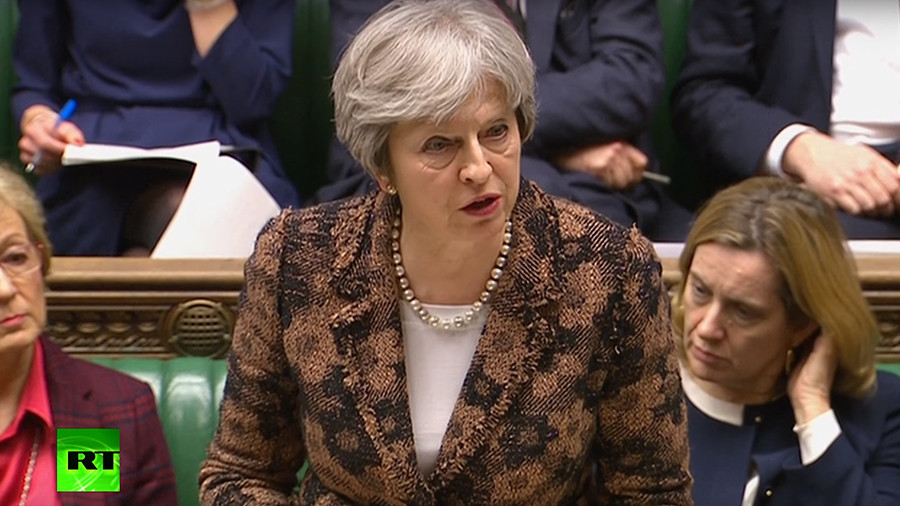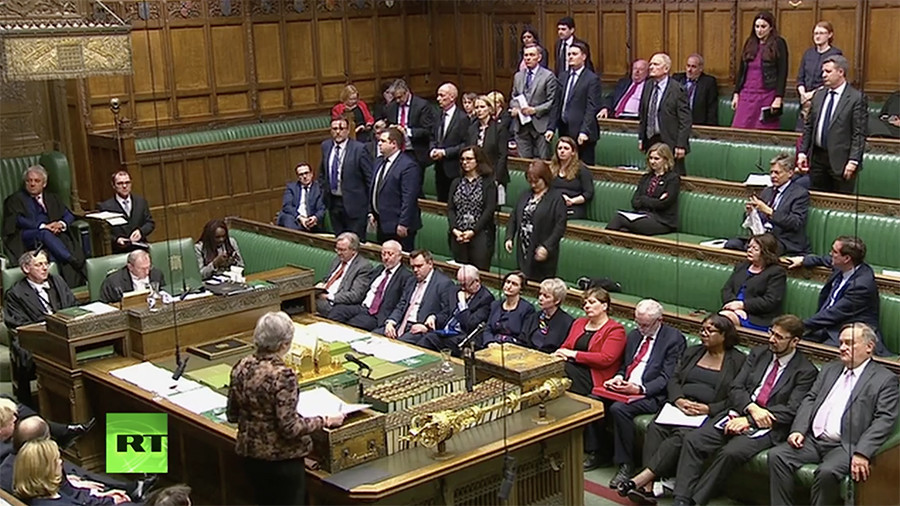Britain gives Moscow two days to explain alleged use of nerve agent from Russia (VIDEO)

12 March, 2018
Britain
has given Moscow two days to explain the alleged use of a
military-grade nerve agent from Russia to poison former double agent
Sergei Skripal. PM Theresa May says it is "highly likely"
Russia was responsible.
She
alleges the attack was either a direct act by the Russian state
on Britain, or the Russian government allowed its nerve agent
'Novichok' to get into the wrong hands. “The
government has concluded that it is highly likely that Russia was
responsible,”
she said.
"Either
this was a direct act by the Russian State against our country, or
the Russian government lost control of this potentially
catastrophically damaging nerve agent and allowed it to get into the
hands of others."
She
added that Boris Johnson, the foreign secretary, summoned the Russian
ambassador to the foreign office on Monday. He said Russia must
explain which of the two possible explanations is the correct one.
She says the ambassador must reply by the end of Tuesday.
May
says if Russia does not give a "credible
response" the
government will conclude that the attack involved "unlawful
use of force by the Russian state against the United Kingdom." May
says if the government does come to that conclusion, she will return
to the Commons to outline retaliatory proposals.
"This
attempted murder using a weapons-grade nerve agent in a British town
was not just a crime against the Skripals. It was an indiscriminate
and reckless act against the United Kingdom, putting the lives of
innocent civilians at risk," she
added.
"We
will not tolerate such a brazen attempt to murder innocent civilians
on our soil."
Skripal,
66, and his 33-year-old daughter have been in hospital in a critical
condition since March 4 when they were found unconscious on a bench
outside a shopping center in Salisbury.
May
says the government will be considering whether dignitaries and
ministers from the UK will be attending the World Cup. But she did
not say anything about the England team boycotting the event, which
suggests that that is not on the agenda.
Labour
leader Jeremy Corbyn has called for a “robust” dialogue with
Russia. "We need to continue seeking a robust dialogue with
Russia on all the issues dividing our countries, both domestic and
international - rather than simply cutting off contact and simply
letting tensions and divisions get worse, and potentially even more
dangerous.”
He
caused uproar among Tory MPs by raising the issue of £800,000
donated by Russian oligarchs to the Conservative Party.
The
Prime Minister chaired a National Security Council (NSC) meeting on
Monday, which brought together senior ministers with intelligence and
security officials.
Russia
has denied any involvement in the attack.
'Circus' at the British Parliament – Russian Foreign Ministry reacts to May's words on Skripal case

A spokesperson for the Russian Foreign Ministry called the hearing at the British parliament on the Skripal case a "circus show."
Follow
RT's coverage of the debate in Parliament
"The
conclusion is obvious: this is another information and political
campaign, based on provocation," said Maria Zakharova,
commenting on the words of Theresa May.
Zakharova's
comments come after May said earlier on Monday that the "attempted
murder" of Skripal was either "a direct act by the Russian
State against our country, or the Russian government lost control of
this potentially catastrophically damaging nerve agent and allowed it
to get into the hands of others."
May
said that the Russian ambassador to the UK has been summoned to the
Foreign Office, and that he must explain which explanation is the
correct one. The ambassador has until the end of Tuesday to respond,
according to May.
If
he does not give a "credible response," the UK will
conclude that the attack involved "unlawful use of force by the
Russian state against the United Kingdom." In that case, May
said she will return to the House of Commons to outline retaliatory
proposals.
"Before
creating new fairy tales, let somebody in the kingdom tell us what
was the result of the previous investigations into the Litvinenko,
Berezovsky and Perepilichny cases," Zakharova suggested.
Zakharova's
comments referenced three high-profile deaths which occurred in the
UK and were blamed on Russia – despite zero evidence to this day.
Russian
Foreign Minister Sergey Lavrov specifically addressed the case of
Litvinenko on Friday, noting that the UK's finger-pointing at Moscow
runs parallel to what happened in that case.
“I
want to remind people that Litvinenko’s death was also attributed
to Russia, but hasn’t been investigated, because court proceedings,
which were called ‘public,’ were, in fact, closed. They were
carried out in a very strange way, and numerous facts, which emerged
throughout the investigation, haven’t come into the public domain,”
the minister said.
Litvinenko
died in November 2006, after assassins allegedly slipped radioactive
polonium 21 into his cup of tea at a London hotel. However, his own
brother Maksim stated in 2016 that Britain had more reason to kill
Litvinenko than Russia.
In
the case of Boris Berezovsky, Putin's critics have long speculated
that the billionaire was murdered by pro-Putin hitmen in 2013.
However, British police said in 2013 that there was no evidence of
foul play relating to this death.
In
addition, no evidence has ever been provided that Russia was behind
the death of businessman Aleksandr Perepilichny, who collapsed and
died in Surrey, UK, in 2012.
Skripal,
66, and his 33-year-old daughter have been in critical condition in
hospital since March 4, when they were found unconscious on a bench
outside a shopping center in Salisbury.



No comments:
Post a Comment
Note: only a member of this blog may post a comment.